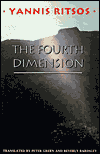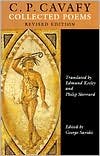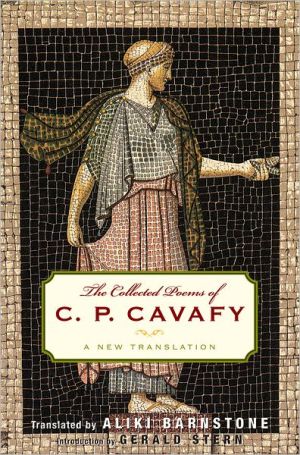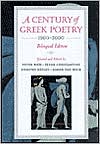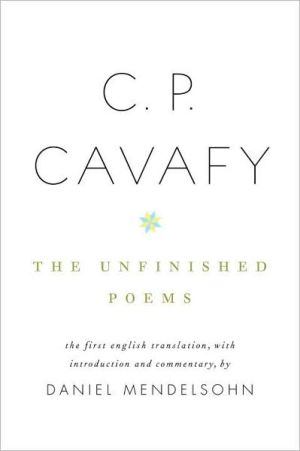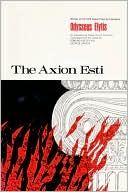The Fourth Dimension
In the dramatic monologues that make up The Fourth Dimension—especially those based on the grim history of Mycenae and its royal protagonists—the celebrated modern Greek poet Yannis Ritsos presents a timeless poetic paradigm of the condition of Greece, past and present. The volume also contains a group of modern narratives, including the famous, and much-anthologized, "Moonlight Sonata." Ritsos, rightly, regarded the The Fourth Dimension as his finest achievement. It is now presented to...
Search in google:
In the dramatic monologues that make up The Fourth Dimension--especially those based on the grim history of Mycenae and its royal protagonists--the celebrated modern Greek poet Yannis Ritsos presents a timeless poetic paradigm of the condition of Greece, past and present. The volume also contains a group of modern narratives, including the famous, and much-anthologized, "Moonlight Sonata." Ritsos, rightly, regarded the The Fourth Dimension as his finest achievement. It is now presented to English- speaking readers for the first time in its entirety.From "Philoctetes"All the speeches of great men, about the dead and about heroes. Astonishing, awesome words, pursued us even in our sleep, slipping beneath closed doors, from the banqueting hallwhere glasses and voices sparkled, and the veilof an unseen dancer rippled silentlylike a diaphanous, whirling wallbetween life and death. This throbbingour childhood nights, lightening the shadows of shieldsetched on white walls by slow moonlight. Publishers Weekly Written during the 1950s and 1960s, this volume is a prominent Greek poet's response to Euripides and other classic tragedians. Complex yet fascinating, it consists of 17 ``sustained dramatic soliloquies'' that present contemporary men and women who seem to inhabit the bodies of mythological figures: Agamemnon, Orestes, Persephone, Ajax, Electra and Phaedra. As in classic drama, each monologue begins and ends with a brief prose passage, setting the scene and recounting what happens after the speaker has exited. Detailed and vivid descriptions of people and places make the poems' mythological present seem a visionary future. Figures who died tragic deaths to fulfill legend are given new life, only to laugh at those who thought them dead. What is the past? all these speakers seem to ask, and the poet answers in the voice of Iphigenia: ``Murders, expeditions, reprisals, sunken ships, ruined regimes.'' Concise notes at the back of the volume remind us who these mythical figures are, show how they've been used in other literature and point out Ritsos's ( Selected Poems 1938-1988 ) often far-fetched groupings. While previous volumes of Ritsos's work have been rendered into English by such esteemed translators as Edmund Keely, two relatively unknown translators here take on this magnum opus and do an excellent job. (Aug.)
AcknowledgmentsIntroductionThe Window3Winter Clarity15Chronicle25Moonlight Sonata37Agamemnon47Orestes63The Dead House83The Return of Iphigenia103Under the Shadow of the Mountain123Chrysothemis147Persephone175Ismene191Ajax215Philoctetes229Helen251Phaedra273When the Stranger Comes295Notes to the Poems313
\ Publishers Weekly - Publisher's Weekly\ Written during the 1950s and 1960s, this volume is a prominent Greek poet's response to Euripides and other classic tragedians. Complex yet fascinating, it consists of 17 ``sustained dramatic soliloquies'' that present contemporary men and women who seem to inhabit the bodies of mythological figures: Agamemnon, Orestes, Persephone, Ajax, Electra and Phaedra. As in classic drama, each monologue begins and ends with a brief prose passage, setting the scene and recounting what happens after the speaker has exited. Detailed and vivid descriptions of people and places make the poems' mythological present seem a visionary future. Figures who died tragic deaths to fulfill legend are given new life, only to laugh at those who thought them dead. What is the past? all these speakers seem to ask, and the poet answers in the voice of Iphigenia: ``Murders, expeditions, reprisals, sunken ships, ruined regimes.'' Concise notes at the back of the volume remind us who these mythical figures are, show how they've been used in other literature and point out Ritsos's ( Selected Poems 1938-1988 ) often far-fetched groupings. While previous volumes of Ritsos's work have been rendered into English by such esteemed translators as Edmund Keely, two relatively unknown translators here take on this magnum opus and do an excellent job. (Aug.)\ \
